Mario Vargas Llosa - A Fish in the Water - A Memoir
Здесь есть возможность читать онлайн «Mario Vargas Llosa - A Fish in the Water - A Memoir» весь текст электронной книги совершенно бесплатно (целиком полную версию без сокращений). В некоторых случаях можно слушать аудио, скачать через торрент в формате fb2 и присутствует краткое содержание. Год выпуска: 2015, Издательство: Macmillan, Жанр: Биографии и Мемуары, на английском языке. Описание произведения, (предисловие) а так же отзывы посетителей доступны на портале библиотеки ЛибКат.
- Название:A Fish in the Water: A Memoir
- Автор:
- Издательство:Macmillan
- Жанр:
- Год:2015
- ISBN:нет данных
- Рейтинг книги:3 / 5. Голосов: 1
-
Избранное:Добавить в избранное
- Отзывы:
-
Ваша оценка:
- 60
- 1
- 2
- 3
- 4
- 5
A Fish in the Water: A Memoir: краткое содержание, описание и аннотация
Предлагаем к чтению аннотацию, описание, краткое содержание или предисловие (зависит от того, что написал сам автор книги «A Fish in the Water: A Memoir»). Если вы не нашли необходимую информацию о книге — напишите в комментариях, мы постараемся отыскать её.
is a twofold book: a memoir of one of Latin America's most celebrated witers, beginning with his birth in 1936 in Arequipa, Peru; and the story of his organization of the reform movement which culminated in his bid for the Peruvian presidency in 1990.
A Fish in the Water: A Memoir — читать онлайн бесплатно полную книгу (весь текст) целиком
Ниже представлен текст книги, разбитый по страницам. Система сохранения места последней прочитанной страницы, позволяет с удобством читать онлайн бесплатно книгу «A Fish in the Water: A Memoir», без необходимости каждый раз заново искать на чём Вы остановились. Поставьте закладку, и сможете в любой момент перейти на страницу, на которой закончили чтение.
Интервал:
Закладка:
Moreover, it was discovered that Fujimori was the owner of a farm of some thirty-five acres — Pampa Bonita — that had been given to him gratis by the Aprista government, on extremely rich land, in Sayán, not too far north of Lima, using, in order to justify that land grant, a provision of the Agrarian Reform Law that provided for the free distribution of land — to poor peasants! Nor was this his only tie to the Aprista administration. For a year Fujimori had had a weekly program on the state television channel, given to him by order of President García; he had been the head of a governmental committee on ecology; he had been the adviser on agriculture of the Aprista candidate in the 1985 campaign; and the APRA had frequently made use of him in various capacities in the course of their five-year administration. (President García had sent him, for instance, as the government delegate to a regional convention in the departamento of San Martín.) If not an Aprista militant, agricultural engineer Fujimori had been assigned missions and been granted privileges by the Aprista government that were conceivable only if he were someone who enjoyed the administration’s confidence. His allegations against “traditional parties” and his persistence in presenting himself as someone undefiled by political service rendered was an electoral pose.
All this appeared in the press as information coming from us, but the one who beat the record for revelations was César Hildebrandt, in his Sunday TV program “En Persona.” A splendid journalist because of his qualities as a tenacious bloodhound, a diligent and tireless investigator, quite a bit more cultivated than the general run of his colleagues, and courageous to the point of rashness, Hildebrandt is also a man with a touchy, surly disposition that makes him very hard to get along with, one whose independence has made him many an enemy and involved him in all sorts of quarrels with the owners or editorial directors of the magazines, newspapers, and TV channels on which he has chanced to work, with all of whom he broke off relations (although very often he made up with them later, only to invariably break off with them once again) whenever he felt that his freedom had been limited or was endangered. This sort of behavior had made him many enemies, of course, to the point that in the end he was even obliged to leave Peru. But it also earned him a prestige and a guarantee of independence and a moral reliability that enabled him to pass judgment and to criticize that no TV journalist had had before (nor, I fear, will have again for a long time to come) in Peru. Though a friend of several sectors of the left and rather close to them, always giving them a platform from which to speak on his programs, Hildebrandt gave clear evidence of a sympathy for my candidacy throughout the primary campaign, without that stopping him, naturally, from criticizing me and my collaborators whenever he thought it necessary.
But in the runoff election campaign Hildebrandt took it upon himself as a moral duty to do whatever was in his power to prevent what he called “the leap into the dark,” for it seemed to him that a victory at the polls by someone who combined improvisation with cunning, plus a lack of scruples, could be like the final, fatal kick for a country which the politics of the last few years had left in ruins and more divided and violent than ever before in its history. Each Sunday “En Persona” presented both more and more attestations and the most severe denunciations concerning Fujimori’s personal business deals — whether open and aboveboard or suspect — together with his hidden ties to Alan García and his authoritarian and manipulative character, of which he had shown signs during his term in office as rector of the National Agrarian University of La Molina. Many of Fujimori’s colleagues in this research center campaigned actively as well, out of fear that he would be elected. Two delegations of professors and employees of the Agrarian University came to see me (on May 19 and June 4) in a public act of support, headed by the new rector, Alfonso Flores Mere (at that time I had a chance to see once again a friend of my early years, Baldomero Cáceres, now a professor at that research center and a stubborn defender of the growing of coca leaves as a crop, for historical and ethnic reasons), and in those meetings the professors from La Molina put forth any number of arguments, which some of them made public on Hildebrandt’s program, concerning the risks that the country could incur by electing as president someone who, as rector of that university, had given obvious signs of an authoritarian personality.
Would those humble Peruvians who, in the first round, had voted for Fujimori because of his image as a person who was independent, with clean hands, poor, politically and racially discriminated against, a David confronting the Goliath of millionaires and powerful whites, become disillusioned with him? I had had indications that that was not going to be how it was one day, around the end of May, when Mark Malloch Brown and Freddy Cooper took me to an advertising agency to watch unseen, thanks to a one-way observation window, one of the periodic explorations that they were making of the mood of the voters of the C and D sectors. It was becoming clear then and it became increasingly clear that, however aggrieved Chirinos Soto or former President Belaunde might feel, humble Peruvians did not have the slightest misgivings about finding themselves to be more closely identified with a “first-generation” compatriot than with one who had had deep roots in the country for centuries. The elections were two or three weeks away and I had already been making tours through the young towns of the capital, inaugurating hundreds of public works projects of the PAS. To judge from what I saw and heard through the observation window during that session, the effort had not borne the slightest fruit. The people who had been asked to come to the agency, some twelve of them, were men and women chosen from among the poorest of Lima’s slum dwellers. The session was being directed by a woman who, with an ease that was proof of long practice, turned those interviewed into veritable chatterboxes. Their identification with Fujimori was unconditional and, if I may use the expression, irrational. They attributed no importance whatsoever to the revelations about his real estate deals and the farm he’d been given and, instead, approved of them as something to be chalked up to his credit: “He’s a really clever rascal, in a word,” one of them said, opening his eyes wide with admiration. Another man confessed that, if it were proved that Fujimori was a tool of Alan García’s, he would feel troubled. But he said that he would vote for him anyway. When the woman interviewing the group asked what impressed them most about Fujimori’s “program,” the only one to come up with an answer was a pregnant woman. The others looked at each other in surprise, as though they were being asked something incomprehensible; she mentioned that the “ chinito ” would give $5,000 to all students who graduated from school so as to be able to set up their own business. When they were asked why they wouldn’t vote for me, it was noticeable that they were disconcerted at having to offer an explanation of something that they hadn’t thought about. Finally, someone mentioned the stands we had taken that were most often criticized: the economic “shock treatment” and education for the poor. But the answer that appeared to sum up best the feeling of all of them was: “Rich people are for him, right?”
In the midst of the “dirty war,” there were comical episodes reminiscent of the days of Pataphysics. *The winner’s laurels went to a news report that appeared on May 30 in the Aprista daily Hoy . It assured readers that it was a word-for-word transcription of a secret report by the CIA concerning the election campaign, in which I was attacked with arguments that bore a noticeably close resemblance to those of Peru’s indigenous left. Because of my friendly attitude toward the United States and my criticisms of Cuba and Communist regimes, on taking over the presidency I might well create a dangerous polarization in the country and stir up anti-American sentiments. The United States should not support my candidacy, since it did not further Washington’s interests in the region. I barely glanced at the article, presented with the scare headline “U.S. Fears MVL’s Arrogance and Obstinacy,” taking it for granted that it was one of those hoaxes thought up by the government-controlled press. To my vast surprise, on June 4, the U.S. ambassador, obviously ill at ease, came to offer me explanations concerning that text. So it wasn’t a hoax, then? The ambassador, Anthony Quainton, confessed to me that it was authentic. It was the opinion of the CIA alone, not that of the embassy or of the State Department, and he had come to so inform me. I remarked to him that the good side of the matter was that the Communists could no longer accuse me of being an agent of that world-renowned agency.
Читать дальшеИнтервал:
Закладка:
Похожие книги на «A Fish in the Water: A Memoir»
Представляем Вашему вниманию похожие книги на «A Fish in the Water: A Memoir» списком для выбора. Мы отобрали схожую по названию и смыслу литературу в надежде предоставить читателям больше вариантов отыскать новые, интересные, ещё непрочитанные произведения.
Обсуждение, отзывы о книге «A Fish in the Water: A Memoir» и просто собственные мнения читателей. Оставьте ваши комментарии, напишите, что Вы думаете о произведении, его смысле или главных героях. Укажите что конкретно понравилось, а что нет, и почему Вы так считаете.












